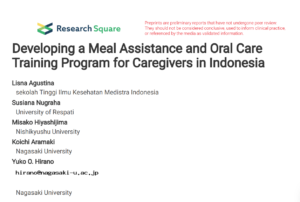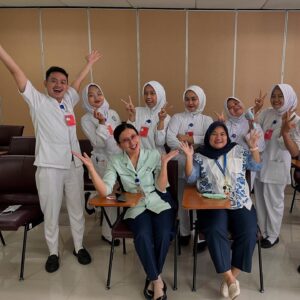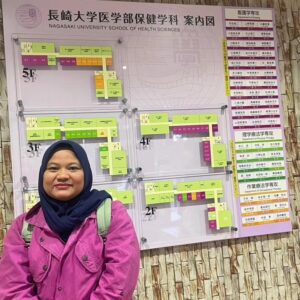Started a Home Nursing and Care Business: An Interview with Ms. Lisna
Ms. Lisna, who balances her role as a nursing university lecturer with running a home nursing and care business, shares how her experience as an EPA care worker candidate has shaped her current career.
Pioneering Challenges
Q: We hear you studied Japanese care work as a first-batch EPA kaigo candidate. Can you tell us about your time there?
A: Yes, since I was in the very first group, we didn’t have any Japanese language training before going to Japan. So, I arrived without knowing the language. My first six months were spent at a language center in Osaka.
Q: It must have been hard living there without knowing much of the language, wasn’t it?
A: It was. My first struggle was with food. As a Muslim, I don’t eat pork. I didn’t know the kanji for it, so I ended up buying and eating ramen that contained it. A few days later, my teacher pointed it out, and I was so surprised! That’s how I learned the kanji for “pork.” Luckily, there were three teachers at the center who spoke Indonesian, which was a huge help.
Q: So after your training, you started working at a special care home for the elderly in Kanagawa, right?
A: That’s right. I was the only Indonesian staff member, but everyone was very kind and welcoming. I started on the floor with residents who had severe dementia. It was a valuable experience to learn how to communicate through care work skills and a good attitude, even without words. I also learned medical procedures I had no experience with in Indonesia, like managing a gastrostomy tube.
Q: I’m really impressed by your proactive approach to learning — how did you do it?
A: Thank you. I really wanted to improve my Japanese, so I asked the director of the facility if I could have a Japanese teacher. They found a volunteer teacher at the city hall who came to teach me about twice a week. The director was also worried about me being alone in Japan and made sure I didn’t get homesick. One holiday, they even drove me to my friend’s house in a distant area. That friend is now my husband, and I’m so grateful to the director and their family.
Return and Success
Q: How did your experience in Japan influence your career after you returned home?
A: After returning to Indonesia, I started teaching at a nursing university and co-founded a home nursing and care company. I had a strong desire to bring the care skills I learned in Japan back to my home country.
Q: You’re truly a “superwoman”!
A: Oh, not at all! (laughs). In our home care business, we emphasize assessment and record-keeping, using the knowledge I gained in Japan. I even created a care worker curriculum myself to train our staff. We also run a club for the elderly, similar to a day service, where they can enjoy themselves from morning until evening. I learned in Japan that kaigo isn’t just about looking after people; it’s about helping them use their remaining abilities. I want to spread that idea in Indonesia.
My husband was also an EPA candidate in my group. After working in Japan, he returned home and now works at Honda. Since he can read and write Japanese, he’s highly valued at the company. I believe his EPA experience gave him the option to choose a career path different from nursing.
Journey with Family and Towards the Future
Q: Balancing work and family can’t be easy — what’s your secret?
A: It is. My son was diagnosed with a speech delay when he was little, so he went to therapy for about two years. It was hard balancing work and raising a child, but with my family’s support, he can speak well now. Hearing my son talk about his dream of going to Japan makes me want to work even harder.

Q: Do you have any future dreams or challenges you want to take on?
A: I want to get my doctorate in Japan, and eventually, I want to build my own kaigo facility in Indonesia. This dream was born from my time learning about care work in Japan. Many elderly people in Indonesia feel lonely, and I want to create a place where they can find a purpose in life and live in peace.

And I want it to be a training facility for students studying nursing and care work so I can teach the excellent care skills I learned in Japan to the next generation.
Q: Lastly, do you have a message for future candidates who will study in Japan?
A: Your experience in Japan will be a great asset for your future. Even now, I continue to learn about new care work skills in Japan through YouTube. Please make the most of what you learn and contribute to your country.
